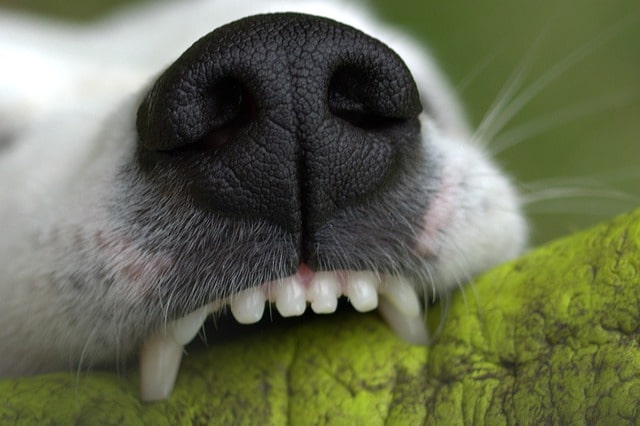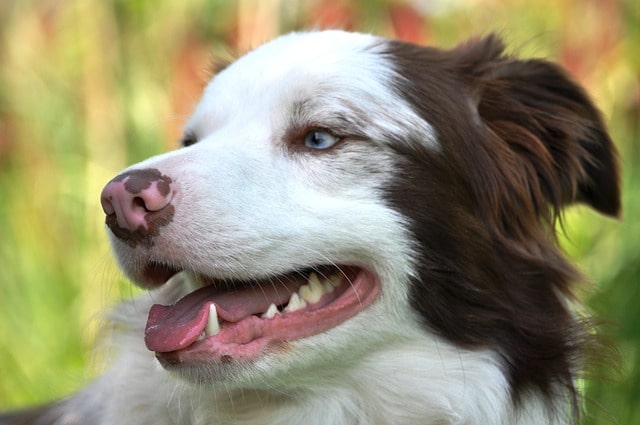Taking care of your Border Collie’s teeth is vital to their overall well-being. These intelligent and active dogs are prone to dental issues such as plaque, tartar, and dental disease, making regular brushing essential. In this guide, we’ll explore the importance of dental care for Border Collies and provide helpful tips to ensure their teeth stay healthy and clean.
Does a Border Collie Have Bad Teeth?

As a highly active breed, they are prone to using their mouths for various tasks, including herding and play. This increased use of their teeth can also contribute to potential dental issues. The long and narrow nose of Border Collies can lead to a higher incidence of overbites. This is simply explained where the upper part of the teeth reaches over the lower teeth when the mouth is closed. Overbites, also known as malocclusions, can cause teeth misalignment, making it more challenging to keep them clean.
How Many Teeth Do Border Collies Have?
An adult Border Collie typically possesses 42 teeth, with 20 on the upper jaw and 22 on the lower jaw. Among these are four incisors at the front on each side, used for cutting food, grooming, and handling prey. Additionally, there are two canines beside the incisors, which serve for gripping prey and, if necessary, defense. The remaining eight tiny pointed teeth on the upper jaw are called bicuspids and don’t have a specific function. Lastly, two premolars and six molars are on each side at the back of the mouth, responsible for grinding food into smaller pieces.
When Does a Border Collie Loses Their Baby Teeth?
At approximately 12 weeks, the baby teeth start to fall out, allowing permanent teeth to come in. Puppies start teething at about three weeks old, and by around six weeks, all of their baby teeth will have come in. The first to appear are the front incisors and the fangs, followed by the premolars. Unlike humans, dogs don’t have baby molars.
When Does a Border Collie Starts Teething?
Border Collie pups will have their first set of teeth at three weeks. At this point, they will have 28 baby teeth or deciduous ones. The teething process can be uncomfortable for these little pups, and you may notice them chewing on various objects to alleviate the discomfort.
When Does a Border Collies Stops Teething?
Border Collies usually finish their teething process around 6 to 8 months old. All their puppy teeth should have fallen out during this period, and their adult teeth should be fully developed. To help ease any discomfort, offering them suitable chew toys and items is crucial.
Teething Timeline of a Border Collie Puppy
While going through the teething phase, young dogs can feel uneasy and may exhibit more chewing tendencies. It’s crucial to offer them a variety of chewable items, including toys with diverse textures like soft, plush, firm, and rubbery materials.
| Age | Event |
|---|---|
| 3 weeks | Teething officially begins when your Border Collie's 28 deciduous teeth start pushing through. |
| 6 weeks | Border Collie should have all of its baby teeth fully emerged, and it should possess a complete set of teeth. |
| 12 weeks | At 3 months old, a Border Collie puppy's 28 baby teeth will begin to be replaced by a full set of 42 adult teeth. |
| 4 months | The adult premolars and canines of a Border Collie typically begin to emerge |
| 6 months | The adult molars of a typically begin to emerge around 5 months of age and should be fully grown in by 6 to 7 months. |
| 8 months | The Border Collie should possess a complete set of 42 adult teeth, with 20 of them situated in the upper jaw and 22 in the lower jaw. |
Ensuring proper dental care and regular dental check-ups are crucial for Border Collies, as they might have a higher tendency to experience dental problems.
Is the Teeth of a Border Collie Blunter Compared to Other Breeds?
Border Collies typically have sharp teeth, and it’s essential to be vigilant about their incisors’ condition by maintaining regular brushing. Failure to do so can result in their incisors wearing down over time. If your Border Collie’s teeth have become blunt, it may indicate teeth grinding during sleep.
What Are Common Border Collie Teeth Problems?
Dental issues are a prevalent concern for pets, with 80% of dogs experiencing problems by age two. Border Collies, like yours, are especially prone to these issues. The problem begins with the accumulation of tartar on their teeth, which can lead to infections in the gums and tooth roots. Typical teeth problems in Border Collies encompass:
- Gingivitis: If you keep ignoring the hygiene of your dog, then sooner or later, it may result in gingivitis, characterized by inflammation of the gums.
- Periodontitis: If not correctly addressed, gingivitis can advance to periodontitis, a more serious condition that impacts the tissues and supporting structures of the teeth.
- Gum Inflammation: Swollen gums may occur due to periodontal disease, leading to discomfort and pain experienced by the dog.
- Dental Disease: Dental disease is a prevalent and chronic issue in pets, with around 80% of all dogs experiencing it by the time they reach two years old. Border Collies, in particular, are more likely to develop dental problems.
- Tooth Root Abscesses: Neglected dental problems can result in tooth root abscesses, causing considerable pain and necessitating veterinary care.
Proper dental care, such as brushing your dog’s teeth, offering dental chews, and regularly taking them for dental check-ups with a vet, can aid in the prevention of dental issues in their teeth.
Broken Tooth
Broken teeth can be a frequent issue and cause significant discomfort for your Border Collie. If your dog experiences any impact on its mouth, like getting hit by something or accidentally colliding with an object, it can lead to a broken or chipped tooth.
Excessive chewing on hard objects can also be a cause. Such dental issues can result in severe pain and potential infections if left untreated. Prompt treatment is crucial to avoid further complications, and the severity of the broken or chipped tooth will determine the appropriate course of action.
Overbite
If you notice that your Border Collie has an overbite, you might wonder if it’s a cause for concern and if there’s a way to address it. Overbites, misaligned teeth, or bad bites can pose challenges for dental health in Border Collies, mainly due to their long straight muzzles, which make them more susceptible to such conditions. An overbite is a hereditary trait passed down from the parents, so responsible breeders will avoid breeding dogs with obvious overbites.
An overbite in Border Collies occurs when their upper jaw is significantly longer than their lower jaw, resulting in misaligned teeth where the upper teeth protrude over the lower teeth. If your Collie puppy has a minor overbite, it’s probably not a significant concern. However, it’s advisable to have your vet check during regular visits, as the issue might resolve itself as the puppy grows.
Teeth Chattering
The most common cause of teeth chattering in Border Collies is often linked to periodontal disease. In this painful condition, inflamed gums and bacterial action can damage teeth, bone, and tissue. Another possible reason could be sensitive teeth due to enamel loss. Dogs tend to conceal their pain, especially in oral discomfort, making teeth chattering a potential sign of an underlying issue that may need veterinary attention. If this behavior is new, you should schedule a visit with your vet for a proper evaluation.
Although dental disease is the primary suspect, it’s essential to closely observe the circumstances in which your Collie exhibits teeth chattering, as it might provide additional clues. Some dogs may chatter their teeth when experiencing anxiety or stress, using it as a coping mechanism in new situations or around unfamiliar people.
Additionally, high-energy Collies may display teeth chattering or grinding when they become over-excited, such as anticipating treats or seeing their favorite toys. By paying attention to the context and seeking professional advice, you can effectively understand and address your dog’s teeth chattering behavior.
Teeth Falling Out
If your Border Collie puppy is experiencing tooth loss, there is typically no cause for concern. However, if your adult Border Collie, aged over 1 year, starts losing teeth, it could indicate a severe issue. This tooth loss in older dogs is often caused by periodontal disease. The condition arises when plaque and gingivitis become severe, leading to tooth decay and weakening of the gums, which may result in teeth becoming loose and eventually falling out.
Border Collie Flat Teeth
Flat teeth in dogs, including Border Collies, can be caused by several factors. Here are some common causes of flat teeth in dogs:
- Tooth Grinding – This is otherwise known as bruxism, in dogs. It can lead to flattened teeth. When dogs grind their teeth sideways, especially during nighttime, it causes the upper and lower canine teeth to rub forcefully against each other. This continuous grinding can gradually wear down the tips of the canines, resulting in shortened and flattened teeth.
- Excessive Chewing – Chewing on hard objects excessively can cause dogs to develop flat teeth. The continuous pressure and rubbing against hard items can wear down their teeth, including the canines, resulting in a flattened appearance.
- Misaligned Teeth – Dogs that have such teeth can lead to the formation of flat teeth. When the upper and lower teeth do not fit together correctly, it can result in irregular wear patterns, which may cause the teeth to become flattened.
Bad Breath in Your Border Collie
Foul-smelling breath, also know as halitosis, is prevalent among dogs, including the Border Collie breed. Pinpointing root cause for this condition will help you correct it early on. Several factors contributing to this problem are:
- Dental Disease
- Unhealthy Food
- Anal gland issue (Licking the anal area)
- Gastrointestinal problems
- Respiratory disease
What Will Happen if My Border Collie’s Teeth Go Bad?
When a Border Collie’s teeth are in poor condition, it can lead to various issues, such as discomfort, eating challenges, and tooth loss risk. These are the potential consequences of dental problems in Border Collies:
- Crooked Bite – The potential outcomes of dental issues in Border Collies.
- Worn Teeth – If your Border Collie’s teeth become worn down, it may result in tooth damage or even lead to tooth loss.
- Periodontal Disease – This is a distressing condition characterized by gum inflammation and the accumulation of bacteria, ultimately resulting in tooth decay and eventual loss.
To avoid these problems, it’s crucial to inspect and maintain your Border Collie’s dental hygiene frequently. Brushing their teeth at least twice a week will help ensure their oral health.
Why Oral Health for Your Border Collie is Important?

Ensuring your Border Collie’s oral health is essential to prevent gingivitis and periodontitis. Dental disease ranks as the most prevalent chronic problem among pets. Truth is, around 80% of dogs by age two are affected by such problems. Border Collies have a higher vulnerability to dental complications compared to other breeds. Therefore, making oral care a priority for your beloved pet is paramount.
By paying attention to their dental health, you can effectively prevent gum disease, which involves painful inflammation of the gums and the buildup of harmful bacteria, ultimately leading to tooth loss and potential complications. Furthermore, regular oral care can help combat bad breath, which often indicates underlying dental issues.
Beyond just the oral cavity, promoting good oral health can also have broader health benefits. By preventing dental problems, you reduce the risk of other severe conditions like heart, kidney, and liver disease, which have been linked to poor oral health in dogs.
Simply speaking, dedicating time and effort to maintaining your Border Collie’s oral health not only enhances their quality of life but also safeguards them from potential health complications in the future. So, take a proactive approach to oral care, which will undoubtedly contribute to your furry friend’s overall well-being and happiness.
How Do You Know if Your Border Collie’s Teeth Need Cleaning?
Every owner wants their dog’s teeth to be clean. After all, this is part of keeping them healthy and happy. With this in mind, ensure you regularly clean your dog’s teeth. And the moment you notice that your Collie is showing signs of teeth problems, have a professional check it immediately.
- Discolored or broken teeth – If you notice any discoloration, cracks, or fractures in your pet’s teeth, it could indicate dental problems. Discolored teeth may suggest tooth decay or staining, while broken teeth may lead to pain and infection. Addressing these issues promptly can prevent further damage and discomfort for your pet.
- Excessive bad breath (halitosis) – Persistent bad breath in pets is often caused by plaque buildup and tartar on their teeth and gums. Bacteria in the mouth produce foul-smelling odors, indicating poor dental health. While some mild bad breath can be normal, excessively foul breath indicates a problem that should be addressed.
- Reduced appetite – If your pet suddenly shows a decreased appetite or reluctance to eat, it could be due to dental issues. Pain or discomfort caused by dental problems can make eating painful for pets, leading to a loss of appetite. Proper dental cleaning can alleviate this discomfort and improve their appetite.
- Bloody drool – Blood in your pet’s drool can be an alarming sign of gum disease or other dental issues. Bleeding gums may result from periodontal disease or injury to the mouth. Ignoring this symptom can lead to severe infections and further complications.
Border Collies Teeth Cleaning Tips
Maintaining your Border Collie’s dental hygiene is crucial for oral health. Here are some useful tips to aid you in teeth cleaning:
- Aim to brush their teeth 1-2 times weekly or ideally daily to maintain your Border Collie’s dental health. Use dog-specific toothbrushes and toothpaste, introduce them gradually, and reward cooperation.
- Incorporate dental chews designed for cleaning your Border Collie’s teeth into their routine.
- Provide your Border Collie with high-quality chew toys and raw, soft meaty bones. Chewing on these items can promote dental hygiene by reducing plaque and tartar buildup.
- Consider using a dental powder cleanser formulated for dogs. You can sprinkle it onto your Border Collie’s food or apply it directly to their teeth to help maintain cleanliness.
How Do You Keep Your Border Collies’ Teeth Clean?
Begin by introducing your Border Collie puppy to the sensation of having its gums examined and touched at a young age. Supply your furry friend with plenty of chew toys to prevent them from chewing on unwanted items and to aid in teeth cleaning through the scraping motion of chewing.
Initiate teeth brushing around 12 weeks old and establish a routine of daily brushing or at least 2-3 times per week using a dental powder cleanser.
Consistency is key; occasionally taking care of their oral hygiene won’t suffice. Make it a regular habit to ensure your beloved Collie maintains healthy teeth throughout their life.
Is There a Natural Way to Clean the Teeth of a Border Collie?
If you prefer a more holistic way of cleaning your dog’s teeth that is free from chemicals, you’re in luck as there are several ways to do so. Here are some natural methods to maintain your Border Collie’s dental hygiene:
- Oral Rinse: One simple and affordable method to maintain your Border Collie’s dental health is by introducing an oral rinse into their water bowl. This easy solution can effectively help care for your dog’s teeth.
- Coconut Oil: Applying coconut oil to your dog’s teeth daily has been shown to effectively prevent the accumulation of plaque, which is responsible for causing unpleasant breath.
- Chew Toys: Providing your Border Collie with a bone to gnaw on can assist in removing food particles that might otherwise lead to plaque accumulation.
It is crucial to emphasize that maintaining proper dental care for your dog at home will result in a happier, healthier, and more extended life for your furry companion. Additionally, scheduling regular professional cleanings with your veterinarian is vital to safeguard your pet’s oral well-being.
Tooth Brushing Your Border Collie
Brushing your Border Collie’s teeth is a crucial aspect of their oral care. It is ideal for brushing their teeth regularly, aiming for at least once or twice a week at a minimum. Make sure to use a toothbrush and toothpaste specially formulated for dogs. Seeking advice from your veterinarian regarding the best dental products for your Border Collie is recommended. If your dog is uncooperative with tooth brushing, alternative options, such as dental chews, dental toys, and water additives, can help maintain their dental health.
How to Brush Your Border Collies Teeth?
Maintaining your Border Collie’s oral health is crucial, and brushing their teeth is vital to their dental care regimen. Below are the steps you should follow when brushing your Border Collie’s teeth:
- Select the appropriate toothbrush and toothpaste for your Border Collie, consulting with your vet for recommendations.
- Familiarize your dog with the toothbrush by allowing them to inspect it beforehand to ease their comfort.
- Begin brushing gently using a circular motion on the outer surfaces of your dog’s teeth, paying extra attention to the back teeth.
- Reward your Border Collie after brushing with treats or praise to create a positive association with the process.
Aim to brush your dog’s teeth as frequently as possible, ideally daily, but at least once or twice a week as a minimum to maintain their dental health. Regular brushing helps prevent plaque and tartar build-up.
How Often Should You Brush the Teeth of a Border Collie?
Maintaining your Border Collie’s oral health is crucial, and regular teeth brushing plays a significant role in their care. Developing a habit of daily brushing starting from approximately 12 weeks old is recommended. If daily brushing is not feasible, aiming for at least 2-3 times a week is beneficial. Even brushing once or twice a week can provide substantial advantages in keeping your Border Collie’s teeth in excellent condition.
Utilizing Dental Chews
High-quality dental chews significantly benefit your Border Collie’s overall health and well-being. These chews are designed to clean your dog’s teeth as effectively as brushing with a toothbrush and toothpaste.
By chewing on them, your dog can remove plaque and tartar, and they often contain ingredients that help prevent further build-up and freshen their breath. Moreover, most dogs love these dental chews, considering them a tasty treat while unknowingly promoting their dental health. Some chews are also long-lasting, keeping your dog mentally occupied. However, it’s essential to be cautious when selecting a dental chew, as some products may contain questionable ingredients or excessive fat and calories.
That said, it is highly recommended to do your due diligence before buying dental chews. There are several ways to make your purchasing decision. For example, you can visit forum sites and ask for recommendations on what product they are using. From here, it will give you an idea of what to expect from a certain item.
Another option is to talk to other dog owners who have similar breeds as yours. Since they’ve tried the product already, they can share their first-hand experiences. On the other hand, be mindful that different dogs might react differently to products. So this is still something you have to bear in mind.
Quality Feeding
Providing high-quality, nutritious food is an excellent method to maintain your Border Collie’s oral health. When the body is nourished, the teeth become stronger, and your dog’s overall well-being improves significantly.
It’s crucial to avoid low-quality ingredients like grains, by-products, and meals that can be harmful and lead to teeth sticking issues. Poor-quality foods contribute to more plaque and tartar buildup, negatively impacting your pet’s dental health and weakening their immune system. Opting for whole foods with natural ingredients can offer beneficial enzymes and supplements that help break down unwanted teeth buildup. However, even if your dog follows a natural diet, regular brushing and dental checkups are essential to ensure optimal dental health.
Other Ways to Keep Your Border Collies’ Oral Health in Good Shape

Maintaining your dog’s dental health is a crucial aspect of their overall well-being and should never be neglected. Here are several methods to maintain your Border Collie’s oral hygiene:
- Ensure they are on a nutritious diet
- Keep their toys clean
- Schedule regular veterinary cleanings
Adding these habits to your daily schedule can promote good dental health for your Border Collie, resulting in a happier, longer, and healthier life for your beloved canine companion.
Conclusion
By prioritizing and maintaining good dental health in your Border Collie, you ensure a brighter smile and promote overall well-being and longevity for your beloved furry companion. Always remember that a healthy mouth promotes a happier and healthier dog, making every wag of their tail much more joyful. So, commit to regular dental care, consult your veterinarian for personalized guidance, and embark on a journey of proactive dental wellness that will undoubtedly strengthen the bond between you and your loyal Border Collie. Together, you can enjoy countless adventures, playtime, and moments of pure happiness, knowing that you provide them with the best possible care and a lifetime of healthy, joyful smiles.


